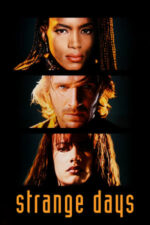"Reality is merely an illusion, albeit a very persistent one." – Albert Einstein
If we could bend time and space to suit our desires, would we? This question, at the heart of technology's seductive promise, fuels the genre known as tech noir. A subcategory of both science fiction (sci-fi) and neo-noir, this cinematic exploration of high-tech dystopias, cybernetic conspiracies, and dark futures blurs lines between reality and illusion. It's a world where technology is not merely an instrument but a character, shaping human experiences in profound ways - often sinister ones.
Dark City, directed by Alex Proyas in 1998, is one such example. Set in a universe without sunlight, it tells the story of a man searching for his past and identity amidst alien beings manipulating humanity for unknown purposes. The film's labyrinthine narrative weaves through themes of memory, love, and survival, creating an immersive experience that leaves viewers questioning their own perception of reality.
Strange Days (1995), directed by Kathryn Bigelow, explores another facet of technoir - the possibility of recording and replaying memories. Lenny Nero, played by Ralph Fiennes, deals in these "implants," leading him down a dangerous path laden with guilt, corruption, and danger. His journey into his past mirrors society's collective fear of losing control over our personal experiences in the face of advancing technology.
Ghost in the Shell (1995), directed by Mamoru Oshii, takes us further into the future where humans are augmented with cybernetics. It delves into issues of identity and autonomy amidst increasing digital integration. As Section 9 fights an elusive hacker known as The Puppetmaster, they grapple with questions about what constitutes human consciousness in a world where our thoughts can be manipulated and stolen.
In James Cameron's The Terminator (1984), technology is not just an enabler but a harbinger of apocalyptic doom. A cyborg assassin sent from a dystopian future to kill Sarah Connor sets off a chain reaction that ultimately determines the fate of humanity itself. This thriller forces us to confront our uneasy relationship with technology: tools that can potentially become lethal weapons in the hands of those who wield them without mercy.
Dateline NBC, while not strictly a film, deserves mention for its exploration of tech-related crimes and mysteries. The series frequently delves into hacking scandals, digital identity thefts, and cyberbullying cases, reflecting our growing reliance on technology and the perils that accompany it.
Antiviral (2012), directed by Brandon Cronenberg, takes a unique approach to tech noir. In this chilling tale, Syd March infects himself with a disease carried by his favorite celebrity - an extreme form of fandom. The film raises questions about the boundaries between reality and fantasy in our increasingly mediated world.
Tech Noir then, is more than just a genre; it's a mirror held up to society, reflecting our dreams, fears, desires, and anxieties surrounding technological advancements. It challenges us to consider how deeply integrated technology has become in our lives and what potential consequences such dependency might bring. Each film serves as a window into possible futures - some hopeful, others dystopian, all thought-provoking. And that's why tech noir isn't just entertainment; it's a journey through the looking glass of tomorrow.































